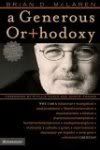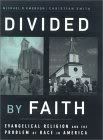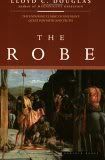 So, I accidentally deleted this post. Does anyone have a copy of it in their inbox by any chance? Crap.
So, I accidentally deleted this post. Does anyone have a copy of it in their inbox by any chance? Crap.
Tuesday, May 08, 2007
A Generous Orthodoxy - Chapters 1 - 4
Posted by Jasie at 7:50 AM
Labels: A Generous Orthodoxy, Books
Subscribe to:
Post Comments (Atom)










14 comments:
Chapter 1:
I love the personal passion I see in McLaren’s writing (I’m also sorry he apologizes for it so profusely) and I enjoyed reading about his journey in The Seven Jesuses I Have Known. I connected with this chapter in that I constantly marvel at where Christ chooses to reveal himself… it is so often in the most unlikely places and in the most unlikely ways. The God of the bible certainly doesn’t shy away from using whatever it takes to get us to see the simple richness of Jesus.
My concerns from this chapter stemmed from the last few paragraphs where I felt that he introduces a buffet style Christianity. He seemed to be saying, peruse the buffet of views and if it looks good, throw it on your plate. Now in McLaren’s defense there is a disclaimer of sorts in the last paragraph that states that we can’t take everything offered… but he doesn’t introduce any way of discerning which views of Jesus we should accept and which ones we should just leave on the buffet.
But there are many chapters ahead for my friend to redeem himself…
Chapter 2:
Jesus as exclusive is something that has come up several times now so here are my thoughts: God took on human flesh in order that all might believe and be saved. This is the inclusive part, the exclusive part is how we become saved… the phrase “I won’t let anyone get to God except through me” seems repulsive or embarrassing to McLaren but yet were those not the very words of Christ according to John 14:6 when Jesus said "no man comes to the Father, but by Me”? I’m claiming here that Jesus taught a very exclusive gospel… all were welcomed… Jesus never turned anyone away that was truly seeking and people were and are drawn to this exclusive gospel that Jesus made available to all through his sacrifice. But the logic is quite simple: If the historical Jesus was God in human flesh, and if He made atonement for our sins, and is therefore the only means of salvation…all other religions are false and lead to death. This sounds pretty exclusive to me. What are yall’s thoughts?
Chapter 3:
I think that there are some benefits to postmodern culture… I believe that Jesus was and we should be committed to a radical vision of liberation, but I disagree that all authorities must be overthrown. The dethroned authorities of the post-modern culture that I think are extremely detrimental to the Faith include texts, authors, traditions, metanarratives, the Bible, God, and all powers on heaven and earth. Now McLaren hasn’t gone this far but I’m getting nervous because it’s a slippery slope once you start “striking” the God-given, revealed names of Jesus (such as Lord, King, and Omnipotent) from the bible because it makes our culture uncomfortable!? I think you’re already half-way down the slide at that point. There is absolutely no scriptural warrant for the church to interpret, amplify, and expand upon the ways of naming the triune God.
Now for the Trinitarian language that has been used to support the idea that God is male and that men are superior to women, that is bogus. McLaren rightly states, "God is not male." On the other hand, God has named Himself as Father, and the linguistic framework God has revealed about Himself, including His names, is grounded in masculine, and not feminine, language or images.
Anna,
I agree that there is a real danger in buffet style religion, but at the same time I can understand his wanting to focus on the commonalities between streams rather than the differences. I know far too many people who still make some fairly startling claims about Catholics (or Pentecostals, or whatever) with little regard for our common roots. However, I'm with you in hoping he draws some attention to the fact that some things on offer are laced with poison.
I'm really curious to hear other responses to your comments about exclusivity. I have a difficult time with the word, personally, and would want to somehow reframe it. Like you say, Christianity makes definite truth claims that are mutually exclusive with other faith systems. But at the same time (and I'm by no means a universalist/relativist) I believe that the love and mercy of God is bigger than we think. As image bearers we are capable of taking all kinds of things into consideration when dispensing justice; how much more so God?
I also agree with you that we shouldn't overthrow all authorities. I would also add that realistically, I don't think we can. But I think we need some sort of hierarchy to appeal to. For me, scripture would have to come first. It critiques my understanding of and experience in the world. But my experience/knowledge also informs my understanding of scripture. (Example: what I know of science is reflected in how I interpret the creation narrative in Genesis.) Scripture isn't contingent on culture, but I don't think we can escape either our cultural re-interpretation or the cultural context into which it was written. So I guess I don't find it such a bad thing to try and take words which had a particular meaning to a particular people, and try and make them relevant for our linguistic usage today. As he rightly notes, I think, our experience with the word King or Lord has very little to do with what the meaning was then.
I'm not sure that made sense, but I guess to nutshell it, I think that the work of interpretation (of scripture, experience, culture, etc.) is part of the mandate to worship and love God with our minds. I think tradition is important, but I also think traditions can be wrong, and as Christians we are responsible for being part of a redemptive movement of culture, including language.
Thoughts?
Here are some of my thoughts on the inclusive\exclusive dialog.
I agree wholeheartedly that all salvation comes through Christ, apart from His redemption, all it lost. However, I agree with Jasie that Gods redemption will probably shock us.
I think a lot of this has to do with how we view judgment. It is (or at least should be) evident to all Christians that God will judge. Romans makes this very clear, and without this, the Gospel is emptied of all meaning.
Paul starts Romans by telling us that we have fallen short and are under Gods judgment (Romans 1:18-32). Then he follows by telling us that we are not the ones to judge:
"Therefore you have no excuse, everyone of you who passes judgment, for in that which you judge another, you condemn yourself; for you who judge practice the same things." (Romans 2:1)
He ends this section talking of those who do not have the law:
"For when Gentiles who do not have the Law do instinctively the things of the Law, these, not having the Law, are a law to themselves, in that they show the work of the Law written in their hearts, their conscience bearing witness and their thoughts alternately accusing or else defending them, on the day when, according to my gospel, God will judge the secrets of men through Christ Jesus." (Romans 2:16)
I say this because I believe that we are called to preach the Gospel, all of it, including God's judgment; but we are also to stop short of passing Gods judgment for Him. I don't want to have any part of condemning someone to hell. And for those outside the law, it says that their conscience can both condemn and defend them. Can I tell you how this may look, no; but that is the point, it is not our place:
"Therefore do not go on passing judgment before the time, {but wait} until the Lord comes who will both bring to light the things hidden in the darkness and disclose the motives of {men's} hearts; and then each man's praise will come to him from God." (1 Cor 4:5)
Everything is redeemed through Christ, apart from Him, we are lost. But who am I to determine the framework and boundaries of Christs redemption? I have been given a framework through which I believe we are saved, I am going to preach that with my heart; but I will not limit Christ. To me it is mute point: Christ will judge, I don't have to worry about it as long as I am doing what I have been commanded.
Sorry for ranting.
Chapter 1: I am curious as to how he suggests we avoid gray soup. I personally try to keep my core beliefs to the essentials (God, Christ, Redemption, the Word, etc). Then I explore God in as many ways as possible (within the guidelines derived from my core beliefs).
Chapter 3: I don't think he is trying to "strike" the terms, but re-examine how we understand and define them.
Hope I was actually able to say something in all of these words.
Josh
(All quotes NASB)
(I hate this word verification thing; there is always at least one character that looks like another [i, j]. I have yet to get it first try; but then again I can be slow sometimes.)
To clarify, when I said "I don't want to have any part of condemning anyone to hell," I did not mean to imply that there is no hell (though I don't have a clear conception of what "hell" entails); I do believe in God's judgment, and that some will not be saved (God is just).
josh
(damn word verification: 3 tries this time)
I have appreciated the excellent discussion and comments. Here are a couple of musings and questions on what people have said so far.
Anna, thanks for your thoughtful interaction with McLaren and for the good points you make.
On chapter 1,
I do wonder about the God of the bible "using whatever it takes to get us to see the simple richness of Jesus." True, unlikely places and unlikely ways, even surprising, but would this kind of statement, in some sense, possibly highlight the concerns that you have about McLaren's buffet? Too wide open - awfully difficult to discern?
On chapter 2,
Seems to me that Jesus comes, first of all, as Israel's savior. Because he's Israel's savior he can also be the savior of the world
and all who come to him. I think you're right, there is a way of salvation that is revealed and that way is Jesus, but access to and the hearing of this revelation may be things that God will take into consideration. Would Judaism be false and lead to death?
On chapter 3,
I'm not sure omnipotent is in the bible? And the good old slippery slope - who's slope? Maybe omnipotent is just another slope - a Greek one in this case.
Not sure what the biblical writers were doing calling God a rock or fortress (masculine), or El Elyon for that matter? Perhaps, McLaren is wanting to open up the notion of metaphor and a re-exploration of names. To be sure we need to be biblically cautious, but a metaphor has a referent and that's what counts.
Jasie, thanks for this conversation and your insights.
I wonder about God's love and mercy being bigger than we might think - not that I don't agree, but where might there, if anywhere, be some limits? Can we talk about love without justice or justice without love?
I agree about traditions being misleading and possibly unhelpful. There is always some good and not so good - but we'll end up making some of our own that will no doubt fit in both categories.
Josh, good points on this. Trust you're well.
I agree, the justice of God, especially today, is crucial to keep in the picture. McLaren can sometimes portray himself as a victim and this may unwittingly, at least for some readers, underplay justice - it is often assumed that victims need only grace not justice. One of the things I wonder about though, is what criteria God will take into consideration when judging?
By the way I think that Rm is primarily dealing with the proud Jew. Paul begins to strip away any appeals to Jewish supremacy as the people of God - the "you" in 2:1 is this person and of course by extension each of us.
And in 1 Cor 4 it seems that Paul is speaking more specifically to the Corinthian problem of favoring - judging certain human leaders as superior to others.
I apologize; I didn't mean to proof text (1 Cor 4), but I did. That is one of the problems with blueletterbible.com and such websites. It is easy to search for what you are looking for, then forget that what you have found has a context outside of the context I have in my own head ( and its only a click away). I will be more careful in the future.
josh
Okay, I knew I had read an applicable passage in 1 Corinthians. It is at the end of chapter 5:
I wrote you in my letter not to associate with immoral people; I {did} not at all {mean} with the immoral people of this world, or with the covetous and swindlers, or with idolaters, for then you would have to go out of the world. But actually, I wrote to you not to associate with any so-called brother if he is an immoral person, or covetous, or an idolater, or a reviler, or a drunkard, or a swindler--not even to eat with such a one. For what have I to do with judging outsiders? Do you not judge those who are within {the church?} But those who are outside, God judges. REMOVE THE WICKED MAN FROM AMONG YOURSELVES.
I Corinthians 5:9-13 (NASB)
Josh -
Thanks for pulling us back to scripture. On the 1 Cor 5 passage, I would want to reinforce that judgment as Paul seems to prescribe it is always for the purpose of bringing the brother back into the fold. It seems like too often it gets used in such a way that leads to people in the church 'shooting the wounded' instead of proper justice tempered with mercy and love, for the purpose of redemption in the lives of all concerned.
Greg -
I can't thank you enough for stopping by. I always appreciate your insights. As to your question about justice and love, I don't think one can exist without the other. True love requires justice. One example that comes to mind is slavery - even if a master is kind to his slaves and treats them well and all are relatively content with their lot, if the institution of slavery itself is evil/unjust, true love requires redemption of the system. So one could love their neighbor in a bad situation, but Love requires more. Shalom requires more. I'm not sure that totally applies to the discussion, but it's what I first thought of... does anyone else have thoughts on this?
Hi Everyone. I am really soaking in all of these thoughts and since I'm number 9 now to speak (number 10 if you include Jasie's original post) I am a little stuck on where to begin.
But let me just mention a certain situation within which I currently find myself.
I lead a philosophical discussion group every Monday evening. This group meets at a local coffee shop and we discuss various ideas and thoughts...very similar to L'Abri formal meals. This group averages about 10 people. I am the only person in the group who comes from a Christian perspective by any form. I am the only person who believes in a relational God, who believes that Jesus Christ is the Savior, and who believes that there is something significant about Christianity. In this group there are people from all sorts of bizarre walks of life. We have people in other religions, cults, sciences, academics....spanning from the age 23 to 72.
I am constantly fascinated by the way that all of these people respond to or critique Christianity, and I am challenged by their liberal minds.
Okay, I was recently out to dinner with one member who comes from what is called the "Liberal Catholic Church". He is an ordained priest through them. He made a comment to me that has stuck with me for a few weeks now. He said, "April, the more you learn about your world, the more liberal minded you will need to become." He was specifically speaking about religion and I appreciate what he said.
I am challeged to keep opening my eyes to see God in new ways, especially because it helps me to relate to people that are coming from bold differences in worldviews. But I am becoming more and more sensitive to the fact that the the heart and purpose of the gospel needs to be preserved.
Sometimes I feel as if the more I open my mind to strange possibilities, the more complicated it makes things. Complications are not always bad...but I am often left feeling as if my "possibility thinking" is attempting to dent the real truth.
I appreciate so much of what Brian McLaren has to say. I appreciate this book (although I am annoyed at his writing style) and I appreciate the movements that are happening in the church...movements that are making the church more relative to this world, and that are pushing towards embodying Christ in a brighter and more effective way. But as I start to apply this open-mindedness in my discussions with my group I start to feel like the raw reality of God's love is a little watered down.
Greg's comment "can we talk about love w/o justice or justice w/o love?" really hits home with me right now.
And the talk about exclusivity really hits home.
These are topics that come up often in my group discussion with non-Christian people and I have a hard time figuring out my feelings.
There have been some incredibly intelligent comments posted here and I feel as if what I'm writing is a little off rhythm and intelligently empty. I'm sorry for that...I hope I am making sense.
As a person who sits at the only Christian in a deep discussion...I will admit that there is a HUGE difference between myself and the group and I recognize my inclusion into the family of God so much more vividly.
This is a simple and possibly stupid questions, but what does it mean to be liberal minded?
Do you think we sometimes take away certain critical elements of the gospel in order to make Christianity seem more appealing or understandable? Do you think we are more guilty of this than we realize?
And finally, the whole buffet/blender question makes me wonder how you find that line between what should be accepted and what needs to be denied.
Well, I appreciate feedback and I hope that I haven't rambled too much. It is very late and my head is full.
Love to you all.
Reading through the book and the posts, I can tell that I'm coming from a wayyyy different perspective from everyone else. So, I wasn't sure that I had anything constructive to add, but I'll post this anyways to add variety if nothing else. I liked the discussion of the different kinds of Jesus' and chapter 3. McLauren asked if Jesus would want to be Christian if he was around today. Good question. (I think Jesus would be a little surprised and confused by the way his whole movement went after he died, but that's a whole other discussion.)
As someone from the outside looking in at what Christianity has become for a number of people today, I've got to say that there are some disturbing trends. A couple of years ago, I was at a friends house watching TV. They had the ultra-cable package with every channel available, and we flipped to this one channel called the Sky Angel Network. Apparently, the Sky Angel Network is this satellite broadcasting company that carries Christian broadcasting versions of every type of show: news, sit-coms, drama, etc. and only Christian versions of these shows. Conceivably, one could never have to be exposed to any programming outside of this bubble (which I think is kind of creepy in of itself).
We watched what appeared to be a taped broadcast of a Christian youth rally from some sports stadium. The program opened with a short video drama depicting a World War II type scenario where young Christian soldiers battled "the secularists" and other non-Christians forces of the world. Then the video footage brought us to this packed stadium - and I mean absolutely packed with teenage Christians, like it was a sold out rock show or something. After that, the pastor or leader of this rally came out dressed from head to toe in military fatigues carrying his Bible. His theme for the rally was to recruit Christian soldiers to take back their country for Christ. He strutted, he shouted, he was in every way like a military commander rallying forces for battle. And meanwhile the crowd cheered and screamed. Suffice it to say, for someone like me, this was something quite disturbing to behold. These weren't a couple of hundred fringe lunatics in a backwoods camp off somewhere. These were legions of middle class, fairly affluent, mainstream American boys and girls listening to what must be a rather popular, successful minister. And yet, I had no idea that anything like this was going on among what I assume to be fairly mainstream Christians in America.
Bringing this back to the book, I appreciate the fact that McLauren speaks as someone from a new Christian movement not interested in heading down the path of militant fundamentalism. Whereas many other conservative Christians are preaching what sounds like a call to arms for an apocalyptic Crusade to reconquer their country and the world in the name of Christianity, (uncomfortably close in it's parallel with Muslim extremist groups who want to conquer the world for Islam) McLauren is not. Instead of the fear-mongering, anger, hatred, lockstep conformity and obedience, and dream of victory through hostile domination coming from so many right-wing Christian conservative churches today, McLaren sounds like he is more interested in love, joy, peace, patience, goodness, kindness, faithfulness, gentleness, self-control, respect, and brotherhood.
I also just want to say that I loved this paragraph from page 82: "Meanwhile for me in the U.S... I feel surrounded by Christians who very much like the idea of an American God and a middle-class Republican Jesus, first and foremost concerned about Our National Security and Our Way of Life... The language of lordship and authority... only seems to serve the 'powers that be,' to bolster the status quo, to legitimize and protect and baptize whatever regime was in power... [I]t sickens me."
Amen, to that.
But moving on... I still have nagging questions about A Generous Orthodoxy, similar to what April was getting at at the end of her latest post. I still don't understand what, if anything, McLauren's point or viewpoint really is. I graduated as an English major, too, and there are many times when I just want to take out a red pen, scrawl, "Thesis statement???" across the page and send it back to him for clarification.
I get the feeling that McLauren wants two contradictory things. On the one hand, it sounds like he wants people to be more accepting of other people's differing points of view. But then he often goes into full retreat mode and qualifies that by saying that he is also committed to a traditional version of Christianity rooted in the creeds, the Bible, and doctrines of old. Well - you can't have both. You can't be both exclusivist and inclusivist. You can't tell people that the Bible is the one and only true revelation, and also tell people that it isn't. You can't tell people that everyone's going to hell unless they accept Jesus as their personal Savior, while at the same time accepting that some people understand that Jesus wasn't God, but a good and inspirational prophetic figure who's example we can learn from. You can try to bridge the gap between contradictory points of view, but that involves compromise, and I think McLauren wants to avoid both compromise and confrontation by remaining intentionally vague.
Again trying to get a fix on what A Generous Orthodoxy is all about, I have the growing suspicion that McLauren wants to think of himself as being somewhat more tolerant and open than he might actually be willing to be. Maybe I'm wrong, and maybe this is uncharitable, but I think McLauren might not really understand the vast divide that exists between his understanding of things like the Bible, Jesus, and God and say, mine, or that of someone like John Dominic Crossan or Bart Ehrman, which affects our basic point of view. I think McLauren is more of a traditional Christian who wants to flesh out a stripped down version of Christianity while still leaving much of the ancient understanding intact in a way that I'm not sure is possible. I could be wrong. It's hard to say since I can't figure out what exactly he does and doesn't believe so much of the time.
David, I really dig your comments and questions. I'm curious to hear what other people have to say in response.
Josh, I'm with you on the word verification thing...this is attempt no.4!
April -
Very cool to hear about the discussion group... how long have you been doing it?
I think 'what does it mean to be liberal/open minded?' is an excellent question. One I don't have a ready answer to, and I'll have to put more thought towards. One thing I don't think that it can mean (and still be positive) is that everything is relative. At a certain point it almost ceases to be a mind if we're not willing to use our intellectual reasoning to discern the good and the true about our world. Other thoughts?
As far as our guilt in watering down the gospel to make it more appealing, I say a huge YES. And I don't think that that falls under the banner of open-mindedness either... more under the "I'm a big weenie" section. I know I catch myself ranting about love and justice and things that practically everyone would say are good things, and pulling away from some elements that are more difficult for me. Which, quite honestly, are some of the more supernatural elements like a virgin birth, etc. But like CS Lewis said, Jesus didn't leave us with a ton of options: Liar, Lunatic or Lord. Trite and overused at this point, but I still find it to be true.
Can't wait to hear your thoughts on all this: where do you draw the line?
David-
I think you could probably add 'grieved' to the list of adjectives of how Jesus feels about the sorry state of much of the church. I'm with you on the disturbing trends. The predominantly insular nature of the church both past and present is a tragedy. And your story of the youth rally makes me cringe. Rob Bell made the comment that 'if it has flesh, it is NOT our enemy'. We've so lost sight of that and made people our enemies - we've expended so much energy fighting each other within the church as well as those beyond its walls, rather than focusing our attention on the actual enemies; you know, those little things like poverty, disease, racism, etc. It makes it really hard for me, as a Christian, to want to identify myself as such. It certainly doesn't make people immediately think "Hmmm, I'd really love to be a part of what's going on there." When I read the gospels, I read about how Jesus was attractive to everybody but the religious elite. There's a growing movement right now (with its own set of problems, granted) that gives me some hope that we're at least moving in the right direction, even though I know we'll never fully get there.
I really like what you said about McLaren trying to avoid both confrontation and compromise. I often catch myself doing that very thing. I don't know how to articulate it very well, and I know it needs more thought, but I can't help believing that both are possible in a loving way... Christ seemed to do it. He never compromised on Truth, confronted evil head on, and yet people drew to Him like a moth to flame.
Wow! Where to start (and what to say!). These are really some thought provoking issues and I'll just throw out a few of my impressions and thoughts.
I wouldn't disagree much at all with the composite picture of Jesus presented in Chapter One as savior,Sprit,victor over death,God made flesh,teacher and example,and liberator. To me, that certainly fits the Jesus I've come to know and love reading the Bible and you couldn't take any of those facets away from him and have a complete rendition. (I don't remember Jesus ever speaking in tongues so I sort of nixed that! And I really loved learning the Greek word for the Trinity (p62-63)-what a beautiful word picture.) The son's question ( and Mclaren's answer) on P. 56 about a better option than heaven or hell really bothered me and I'm curious to see where he's going with that. I'm with the rest of you guys about the buffet-he fails to tell you what the criteria are for accepting/rejecting and I'd say that's a pretty important issue.
I really could care less what pronouns you use to describe God but I liked the way he defined "Son of God" as conveying the image or essence of God and how that image" fits his deepest experience
and resonates with his best inuition and hopes".I feel the same.
Chapter 3...not so crazy about!. He sure does paint with a broad brush. I'm sur there are tons of things about the church that jesus would be thoroughly ashamed of and about my own life God probably just rolls his eyes about a hundred times a day. I know we get it wrong so many times-we think it's all about us instead of all about him ,we misrepresent him and misinterpret him in ways that must be so abhorrent to him. Our job as "little Christs" is to imitate him ( all the qualities that you mentioned ,David- peace, love, kindness, compassion,etc.) so that people will be attracted to his good,liberating message that offers life over death,faith over fear.But when we fail to season the message with grace (and truth),we sometimes end up bludgeoning people or Phariseeing them to death oor promising them things that God never promised (like health,wealth and prosperity) and they just end up more disappointed and disillusioned with God thabn they were to begin with.
But experience tells me that this is just part of the picture. I know tons of humble,loving Christians who are trying to give people true spiritual hope (for now and eternity) and who are putting their lives, their resources,their time and emotions into helping people who are struggling with physical or emotional needs. They don't view people as "projects" or "potential converts" and certainly not as the enemy ( like your spiritual Nazis,David.Yikes! I hope in context that was not as frightening as it sounds.)
Man. I must be getting wordy-I just got shut off but I wanted to add a few more comments.(Lovely,you say.)
April, I think you are practicing a wonderful sort of "generous orthodoxy"-developing relationships, inviting dialogue,exploring new ideas but being careful to "preserve the heart and purpose of the gospel". That's a hard line to walk,isn't it? To be sensitive to other peoples' views and yet not remove critical elements of your own faith that might make it more palatable to others but that would render it meaningless and pretty much your own creation instead of God's.
For me, on the exclusion/inclusion issue (which I certainly don't mean to imply is a simple one),I think it sort of comes down to an authority issue. For lots of good reasons, I believe God created everything seen and unseen so He gets to make up the rules and he doesn't have to ask our permmission or opinion. The Bible seems to me to say pretty clearly that faith in Him and in the sacrifical death of his son for the atonement of our sins is the way to relationship and life and inheritance. What allowances he makes for our individual circumstances I would never presume to guess. He's a wild man and his ways are way beyond my realm of comprehension. But I rest in the fact that he is both gracious and just and what he chooses will be just right.
Thanks for listening. Look forward to next week.
Janie (Mom)
Post a Comment